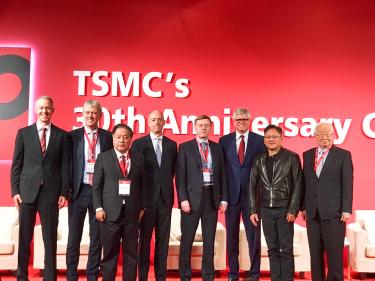Apple Inc is grateful to Taiwan Semiconductor Manufacturing Co’s (TSMC, 台積電) capital investment of US$9 billion in the Taiwanese firm’s first initiative with Apple to supply all the processors used in iPhones and iPads, Apple chief operating officer Jeff Williams said yesterday.
Williams made the remarks at a panel discussion in Taipei organized by TSMC as part of a series of activities celebrating the 30th anniversary of the foundation of the world’s biggest contract chipmaker.
Williams did not specify which iPhone he was referring to.
“TSMC invested US$9 billion and had 6,000 people working around the clock to bring up the Tainan fab in just 11 months, and in the end, the execution was flawless,” Williams said. “Companies in the world spent US$9 billion in capital across everything, not a single bet.”
In that short period of time, Apple and TSMC together shipped more than 500 million chips, Williams said.
However, the first seed of the partnership between Apple and TSMC was planted in 2010, the Apple executive said.
TSMC’s leading technology position and its long-term strategy of being the trusted capacity supplier for semiconductor companies helped it secure the first orders from Apple, beating rival Samsung Electronics Co.
“We want leading-edge technology, but we want it at established technology kind of volume,” Williams said. “And what seems obvious right now wasn’t then because the risk was very substantial.”
For TSMC, it was a huge capital investment and meant ramping up production faster than the industry is used to, Williams said. “But, together, we decided to take the bet... Apple decided to have 100 percent of our new iPhone and new iPad application processors sourced to TSMC.”
TSMC chairman Morris Chang (張忠謀) said the company’s partnership with Apple has been intense and is important, even though it did not go back very far.
TSMC is still the sole chip supplier for Apple’s latest A11 Bionic chip used in the latest iPhones.
To produce and develop advanced process technologies such as 7-nanometer and 5-nanometer chips, TSMC budgeted a record capital expenditure of US$10.8 billion this year, and its annual budget is to stay above US$10 billion over the next few years.
Chang yesterday gave a bullish outlook about revenue growth in the global semiconductor industry.
He predicted that the industry will post a compound annual growth rate of between 4.5 and 5.5 percent in the next decade, exceeding global GDP growth.
TSMC will outgrow the global semiconductor industry as it aims to increase revenue by between 5 and 10 percent a year, he said.
Broadcom president and chief executive officer Hock Tan forecast that the industry’s growth would match the global GDP growth, which could be in the range of between 2.5 and 3 percent a year.
Answering an analyst’s question about when Moore’s law will come to an end, Chang said that the original version of Moore’s law is no longer valid, as it has a time element.
“The doubling of density is continuing, but not every 18 to 24 months [as the law says],” Chang said.
The economic feasibility of density doubling will be tested in 2025 before geometry shrinking reaches its physical limit, Chang said.
TSMC will continue to work on density doubling for another eight years, Chang said.




